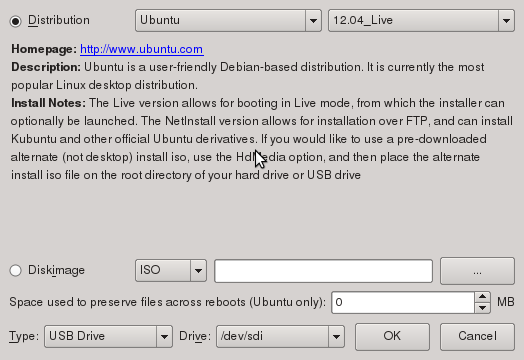Difference between revisions of "Install Linux on a USB disk with Unetbootin"
From Linuxintro
imported>ThorstenStaerk (Created page with "UNetBootIn allows you to install Linux to a harddisk from the network or from a bootable CD, DVD, harddisk or image. * download unetbootin from http://unetbootin.sourceforge.n...") |
imported>ThorstenStaerk |
||
| (5 intermediate revisions by the same user not shown) | |||
| Line 1: | Line 1: | ||
| − | UNetBootIn allows you to | + | UNetBootIn allows you to [[create a bootable USB disk]] from the network or from a bootable CD, DVD, harddisk or image. Here is how you do it. '''''This has stopped working for me with UEFI boot computers.''''' |
| + | |||
| + | For my UEFI style computer I used the software [https://rufus.ie/ Rufus]. | ||
| + | |||
| + | = install unetbootin = | ||
* download unetbootin from http://unetbootin.sourceforge.net | * download unetbootin from http://unetbootin.sourceforge.net | ||
| − | * [[open a console]] | + | * [[install]] some dependencies, in this case for SUSE Linux: |
| + | yast -i libpng12-0-32bit p7zip | ||
| + | * [[open a console]], make the downloaded file executable, e.g.: | ||
| + | cd | ||
| + | cd Downloads | ||
| + | chmod 777 unetbootin-linux-575 | ||
| + | |||
| + | = insert your USB stick = | ||
| + | * [[open a console]] as root and clear your syslog: | ||
| + | dmesg -c | ||
| + | * insert your USB stick | ||
| + | * find out what device has been attached by reading the syslog, e.g.: | ||
| + | # dmesg | ||
| + | [22005.395073] sd 9:0:0:0: Attached scsi generic sg5 type 0 | ||
| + | [22005.397312] sd 9:0:0:0: [sd''i''] 15858688 512-byte logical blocks: (8.11 GB/7.56 GiB) | ||
| + | : in this case an 8 GB USB stick has been inserted and become known as ''/dev/sdi'' | ||
| + | |||
| + | = use unetbootin = | ||
| + | * start unetbootin: | ||
cd | cd | ||
cd Downloads | cd Downloads | ||
| − | |||
| − | |||
./unetbootin-linux-575 | ./unetbootin-linux-575 | ||
| − | |||
| − | |||
| − | |||
| − | |||
* select which distribution you want to have installed on what disk: | * select which distribution you want to have installed on what disk: | ||
[[File:unetbootin.png]] | [[File:unetbootin.png]] | ||
Latest revision as of 13:40, 5 January 2020
UNetBootIn allows you to create a bootable USB disk from the network or from a bootable CD, DVD, harddisk or image. Here is how you do it. This has stopped working for me with UEFI boot computers.
For my UEFI style computer I used the software Rufus.
install unetbootin
- download unetbootin from http://unetbootin.sourceforge.net
- install some dependencies, in this case for SUSE Linux:
yast -i libpng12-0-32bit p7zip
- open a console, make the downloaded file executable, e.g.:
cd cd Downloads chmod 777 unetbootin-linux-575
insert your USB stick
- open a console as root and clear your syslog:
dmesg -c
- insert your USB stick
- find out what device has been attached by reading the syslog, e.g.:
# dmesg [22005.395073] sd 9:0:0:0: Attached scsi generic sg5 type 0 [22005.397312] sd 9:0:0:0: [sdi] 15858688 512-byte logical blocks: (8.11 GB/7.56 GiB)
- in this case an 8 GB USB stick has been inserted and become known as /dev/sdi
use unetbootin
- start unetbootin:
cd cd Downloads ./unetbootin-linux-575
- select which distribution you want to have installed on what disk:
